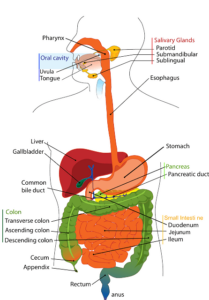2 digestion processes to learn about
The digestion malfunctioning signs can lead to very troublesome situations in our daily life and long-term impact on our state of health.
You’re watching a movie in a packed movie theater, and then you feel a severe stomach pain, forcing you to go to the bathroom immediately…
Before you go on stage in a play, you are nervous and get a violent stomach ache…
To help you understand why these digestion problems occur and how to make sure your body digest foods in the best way, read through this article to find out more.
How does the digestion process work:

Once the food passes through the mouth to the stomach to contract, crush and decompose this food bowl with the help of gastric juices, a mixture of enzymes and hydrochloric acid secreted by the cells of the stomach and when the food bowl is liquefied and transformed into chyme, it is discharged into the small intestine. salivary, hepatic and pancreatic acorns. It transforms food into small molecules that can be absorbed by the cells of the digestive tract and used by the body.
Digestion can last from a few minutes to several hours, depending on the quality, composition, preparation and conditions of the meal. An average that is difficult to establish with precision can be between eight or ten or even twelve hours. It varies depending on the person’s health conditions among other factors.
Digestion begins as soon as you chew. While teeth break food into small pieces, saliva facilitates swallowing and begins chemical digestion of carbohydrates through enzymes called amylases. The food then descends into the esophagus, a tube about 25 cm long, leading to the stomach.
Digestive comfort requires a good lifestyle:
To ensure your digestive comfort , there are many habits that should be part of your lifestyle to avoid suffering from digestive diseases, which can be summarized as follows:
- Eat three meals a day, at regular times, sitting and quiet if possible for at least 20 minutes.
- Reduce tobacco consumption.
- Avoid wearing tight clothing that compresses the belly.
- Take time to chew before swallowing.
- Limit the use of anti-inflammatory drugs and aspirin.
- Perform regular physical activity.
- The easiest way to succeed is to drink when thirst is felt. No need to prohibit water during meals, this leads most of the time to dehydration.
How do we digest food?
The process of digestion is repeated tirelessly after each meal. Thanks to this system, we absorb more than 90% of the proteins, fats and carbohydrates we eat, a slightly lower percentage of vitamins and minerals. This digestion system is comparable to an industrial disassembly line. It consists of a succession of organs each with a specific role, from food fragmentation to nutrient assimilation.
Digestion itself is a combination of two processes:
Mechanical digestion
It takes place especially in the mouth and stomach. It reduces food to mush. The teeth grind the food into small pieces and in the stomach the brewing and contractions continue this fragmentation work.
Chemical digestion
It takes place throughout the digestive tract through enzymes and digestive juices such as saliva, hydrochloric acid secreted by the stomach or bile secreted by the liver. Chemical digestion dissolves nutrients and divides them into assimilable elements.
After absorption, the nutrients pass into the blood, which takes them to the liver where they are treated before being distributed to the rest of the body. Nutrients are then used or, when the body’s needs are met, accumulated to build up reserves.
The way we eat is also crucial in the digestive process! It is important to take the time to chew well before swallowing. Keep in mind that a meal should last at least 20 minutes. The ideal is to take three meals a day, at regular hours, sitting and in a quiet environment.
As for physical activity, gentle practices such as the Pilates method and yoga, are often recommended in case of digestive disorders.
The origins and characteristics of digestive disorders

The term “digestive disorders” refers to many types of digestive difficulties. These disorders can occur one time during a period that is particularly charged psychologically, for example – or chronic.
The appearance of a digestive disorder or, more broadly, poor digestion can be linked to:
- Disturbance or weakness of one of the key organs of digestion: esophagus, stomach, intestine.
- Psychosomatic or emotional factors such as stress , anxiety, anger, excitement, sadness (this is called digestive stress).
- A diet too rich in fat, too copious, more generally unsuitable.
- Dyspepsia manifests as chronic discomfort, centralized in the area of the stomach or epigastrium. This disorder is characterized by bowel pain, bloating, feeling “poorly digested”, “overflow” after eating, or, conversely, a feeling of early “satiety”.
- Aerophagia occurs when your stomach fills with a large amount of air that causes swelling, bowel pain and eructations (eg, if you swallow too much air while eating or during the day). Pregnant women are at greater risk of developing aerophagia.
Digestive system disorders include several sources: diseases that affect several parts of the digestive system or even those affecting only one part of the system. Many and varied, ood allergies or intolerances may be the main cause.
If you experience symptoms such as: Dehydration (cramps, hollow eyes, urge to urinate infrequently), they occur after taking a new medication, and you have difficulty swallowing (food and other), you suddenly lose weight and have a fever and persist for a long time do not hesitate to observe your stool and go to your doctor.
Are you suffering from digestive problems? Tell us how?
